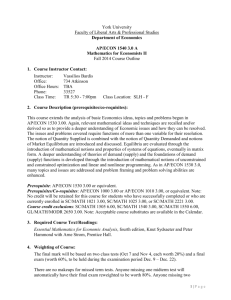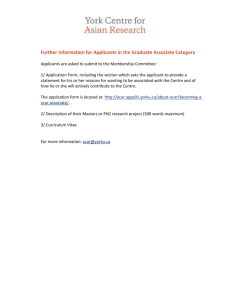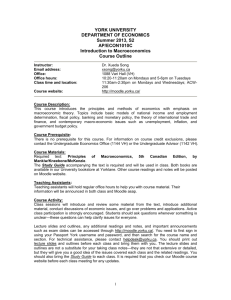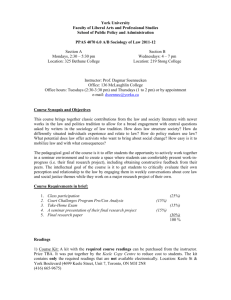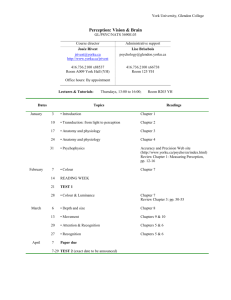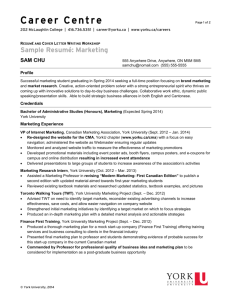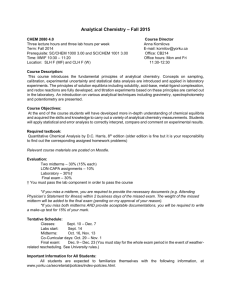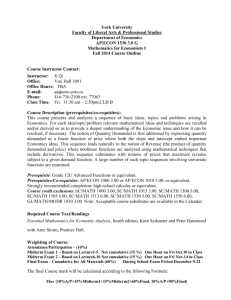4410 A F13 correct - Faculty of Liberal Arts & Professional Studies
advertisement
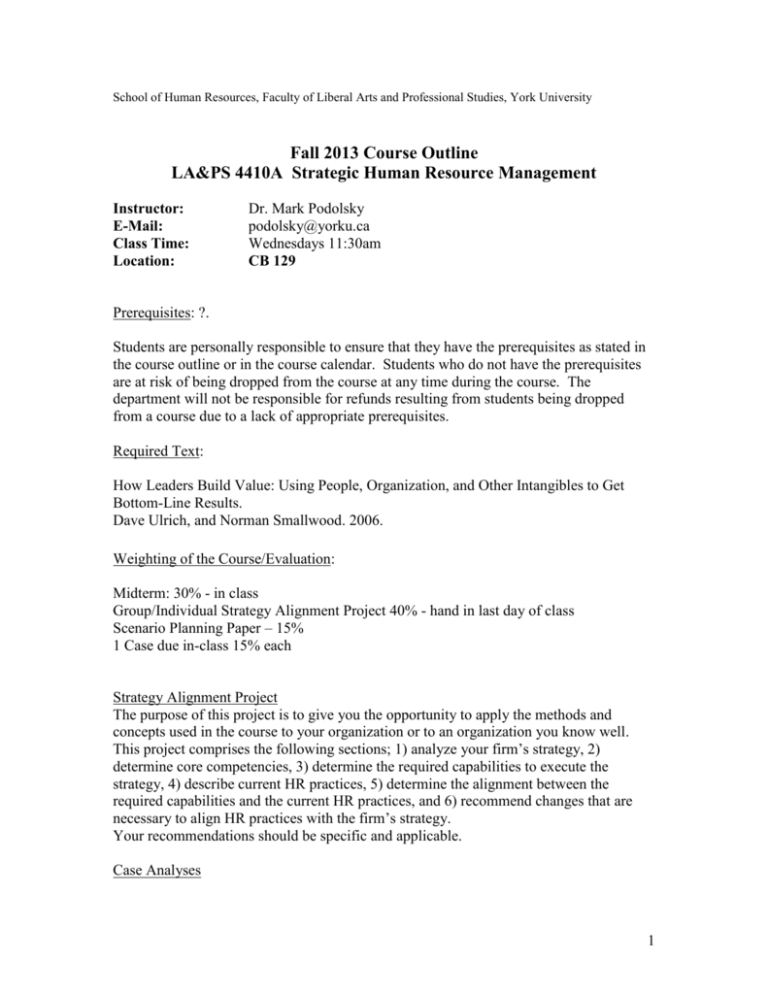
School of Human Resources, Faculty of Liberal Arts and Professional Studies, York University Fall 2013 Course Outline LA&PS 4410A Strategic Human Resource Management Instructor: E-Mail: Class Time: Location: Dr. Mark Podolsky podolsky@yorku.ca Wednesdays 11:30am CB 129 Prerequisites: ?. Students are personally responsible to ensure that they have the prerequisites as stated in the course outline or in the course calendar. Students who do not have the prerequisites are at risk of being dropped from the course at any time during the course. The department will not be responsible for refunds resulting from students being dropped from a course due to a lack of appropriate prerequisites. Required Text: How Leaders Build Value: Using People, Organization, and Other Intangibles to Get Bottom-Line Results. Dave Ulrich, and Norman Smallwood. 2006. Weighting of the Course/Evaluation: Midterm: 30% - in class Group/Individual Strategy Alignment Project 40% - hand in last day of class Scenario Planning Paper – 15% 1 Case due in-class 15% each Strategy Alignment Project The purpose of this project is to give you the opportunity to apply the methods and concepts used in the course to your organization or to an organization you know well. This project comprises the following sections; 1) analyze your firm’s strategy, 2) determine core competencies, 3) determine the required capabilities to execute the strategy, 4) describe current HR practices, 5) determine the alignment between the required capabilities and the current HR practices, and 6) recommend changes that are necessary to align HR practices with the firm’s strategy. Your recommendations should be specific and applicable. Case Analyses 1 The first case listed in the course outline will be analyzed together, in class. The second is to be analyzed as an individual assignment. The focus of this case analysis is to perform a 5-forces analysis, a Diamond-E strategic analysis, and develop core competencies for the firm as well as an analysis of what HR practices are required to align with the firm’s strategy. The case analyses should be roughly 3-4 pages (double spaced, 12-point font) in length. Project Presentations Students are encouraged to present their projects either as a group or using an individual group member. Presentations should be no more than 10 minutes in length. Scenario Planning Paper As an alternate means to arrive at core competencies, we will explore scenario planning. Over the course of 2 classes we will cover SWOT analysis, Scenario Planning, and Stakeholder Analysis. The paper is a swot, scenario planning, and stakeholder analysis of the HR profession from your perspective. The purpose of the paper is to demonstrate an understanding of this type of strategic analysis as well as to develop greater insight into your development as a current or future HR manager. Course Readings The course is organized into three main themes: 1) Organization Strategy, 2) The Formulation of Human Capital, and 3) the Alignment of Human Capital with Organization Strategy. Class time will be used to discuss and synthesize the main points from each reading assignment and to place the learning from each reading assignment into the context of the course themes. Students are expected to have read and taken notes for each reading assignment. Course Schedule: Date Topic Sept. 11 Sept.18 Firm Strategy 1 Firm Strategy 2 Sept.25 Firm Strategy 3 Oct.2 Human Capital 1 (individual level) Oct.9 Job Analysis & Core Competencies Oct.16 Oct.23 Oct.30 Human Capital 2 (Group level: climate, norms, identity) Midterm Building Core Reading Assignment Porter; Mintzberg Crossan Case 1 (eHarmony) CH.1 Intangibles; Barney; Ployhart Ch.3; Ch.4; Sanchez & Levine Bryan; Bowen & Ostroff; Ashforth & Mael Note Case 2 (Porcini’s) due Ch.5 2 Nov.6 Nov. 13 Nov.20 Nov.27 Dec.4 Competencies No Class Core Competencies Organizational Learning;Leadership Leadership & Intangibles Presentations Ch.8; Yeo; Senge;Ch.10; Conger Scenario Planning Paper due CH.12 IMPORTANT YORK POLICIES: Academic Honesty (Senate Policy) Breaches of the Senate Policy on Academic Honesty are serious matters. To quote the Senate Policy on Academic Honesty: The Policy on Academic Honesty is a reaffirmation and clarification for members of the University of the general obligation to maintain the highest standards of academic honesty. It outlines the general responsibility of faculty to foster acceptable standards of academic conduct and of the student to be mindful of and abide by such standards. Faculty members are encouraged to pursue suspected cases of academic honesty with formal charges. Students should, however, review the York Academic Honesty policy for themselves at: http://www.yorku.ca/secretariat/legislation/senate/acadhone.htm Students might also wish to review the interactive on-line Tutorial for students on academic integrity, at: http://www.yorku.ca/academicintegrity/tutorial.htm Grade Component Deadline (Senate Policy) The course assignment structure and grading scheme (i.e. kinds and weights of assignments, essays, exams, etc.) must be announced, and be available in writing, to students within the first two weeks of classes. Please see Important Dates at: http://www.registrar.yorku.ca/importantdates/fw05.htm Graded Feedback Rule (Senate Policy) Under normal circumstances, some graded feedback worth at least 15% per cent of the final grade for Fall, Winter or Summer term, and 30% for ‘full year’ courses in the Fall/Winter term should be received by students in all courses prior to the final withdrawal date from a course without receiving a grade, with the following exceptions: 3 graduate or upper level undergraduate courses where course work typically, or at the instructor's discretion, consists of a single piece of work and/or is based predominantly (or solely) on student presentations; practicum courses; ungraded courses; courses in Faculties where the drop date occurs within the first three weeks of classes; courses which run on a compressed schedule (a course which accomplishes its academic credits of work at a rate of one credit hour per two calendar weeks or faster). Note: Under unusual and/or unforeseeable circumstances which disrupt the academic norm, instructors are expected to provide grading schemes and academic feedback in the spirit of these regulations, as soon as possible. For more information on the Graded Feedback Rule, please visit: http://www.yorku.ca/secretariat/legislation/senate/gradfeed.htm 20 % Rule (Senate Rule) No examination or test worth more than 20 % of the final grade will be given during the last two weeks of classes in a term, with the exception of classes which regularly meet Friday evenings or on the weekend (Saturday and/or Sunday at any time). For further information on the 20% Rule, please visit: http://calendars.registrar.yorku.ca/examschedules/examinfo/twentypercent .htm. For further information on examination scheduling, please see "Notes" in the table: Reappraisals For reappraisal procedures and information, please visit the Office of the Registrar site at: http://www.registrar.yorku.ca/services/policies/grade.htm Accommodation Procedures: Deferred Standing Students who have experienced a misfortune or who are too ill to attend an examination in a course should not attempt to do so; they must pursue deferred standing. Other students should contact their home Faculty for information. For further information, please visit: http://www.registrar.yorku.ca/services/ds_faq.htm Students with Special Needs (Senate Policy) York University is committed to making reasonable accommodations and adaptations in order to make equitable the educational experience of students with special needs and to promote their full integration into the campus community. Please alert the Course Director as soon as possible should you require special accommodations. 4
